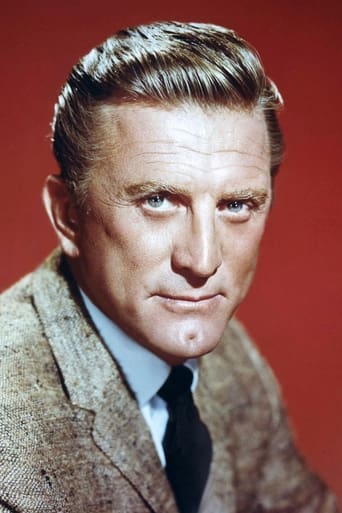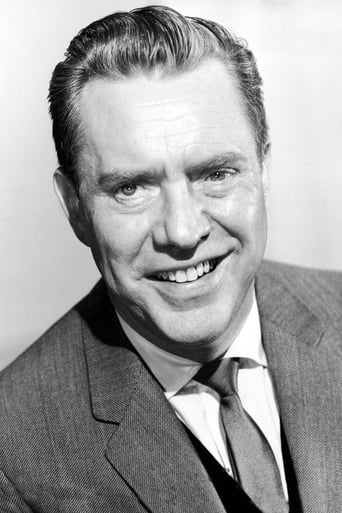mmallon4
Seven Days In May is a film which tapped into cold war paranoia but still has relevance for today's increasingly unstable political world. Now that we have arrived in the age of Trump and many people would shockingly actually like the premise of this high concept political thriller to play out successfully in real life, what better time to revisit Seven Day In May. A military coup in the United States? This is the kind of thing that happens in banana republics, not in the most powerful nation on Earth. The fantastical set up is the appeal of a movie like this; the idea that the so called haven of democracy could potentially crumble. The big question though; could it happen in real life? Are the events in the movie plausible? To the laymen viewer they are at least.Seven Days In May has some powerhouse actors with serious charisma talking some serious politics; no action, just heart pounding wordy exchanges. General Scott (Burt Lancaster) is a believer in a nuclear deterrent and doesn't trust the Russians to hold their side of the deal. Is he someone who has genuine concern or is he a megalomaniac taking advantage of a situation or both? The pairing Burt Lancaster and Kirk Douglas couldn't be a better combo as military personal with a mutual respect for each other. Their relationship is where much of the film's emotion is drawn from with Douglas looking up to Lancaster and his eventual betrayal of him. Ava Gardner on the other and is the weakest link in an otherwise stellar cast. I've never thought much of her as an actress and this comes through here with a performance which is serviceable not much more.The scene in which Kirk Douglas is pitched with the task of explaining to the President there may be a military coup to overthrow his administration is one of the best examples of expository delivery I've ever seen. I believe there are two reasons for this; firstly Kirk Douglas' sheer screen presence and charisma and secondly, the tension drawn from him embarrassing himself while trying to explain such a fantastical military coup. He delivers the lengthy monologue nervous and under pressure but while still remaining dignified. Plus that camera zoom and head tilt when he summarises his monologue makes the hairs stand up.John Frankenheimer is one of the most visually striking directors in black & white with his use of shades of tones, he has a very striking style. The Saul Bass style opening credits on the other hand show why the 1960's was a golden age for title sequences as Hollywood attempted to draw audiences away from the TV and into the theatre.Fredric March makes for a convincing leader as President Jordan Lynman. He is not a Trumpain figure, no he's far humbler than that. His course of action over the last year bordered on criminal negligence, or at least according to General Scott. He has a 29% approval rating and the public has voiced "a universal rejection of your entire political philosophy" according to Gallop poll; he is a man who is not upholding his democratic mandate. Should there still be a respect for the office of the president if the country is against him? What's more important, protecting a country against its government or loyalty to the constitution? The viewer is left to make up their own mind and the movie does not take sides. We never know the political ideology of any of the characters; the words republican, democrat, conservative or liberal are never mentioned. Seven Days In May is a movie with no clear cut hero or villain; both sides believe what they are doing is for the best of America and by extension the world. By the end the answer as to who Judas is not so black and white ("Yes I know who Judas was. He was a man I worked for and admired, until he disgraced the four stars on his uniform").
grantss
Powerful Cold War drama.It is the height of the Cold War and the US President, Jordan Lyman (played by Fredric March) has negotiated a nuclear arms limitation treaty with the Russians. The military and some politicians are not happy with this, figuring the Russians will renege on the deal, leaving the US vulnerable. Foremost among the opponents of the treaty is General James Scott (played by Burt Lancaster), Chairman of the Joint Chiefs of Staff. On his staff is a Marine Colonel, "Jiggs" Casey (played by Kirk Douglas), who starts to suspect that the General may be planning a coup...Intriguing, entertaining drama. Mostly plausible, though there is some looseness in the plot. In addition, it demonstrates well the link between politics and the military, and who, in a democratic society, takes orders from whom.Solid performances all round. Edmond O'Brien was nominated for a Best Supporting Actor Oscar for playing the drunken-but-resourceful Senator Clark.
tieman64
"The crimes of the United States have been systematic, constant, vicious, remorseless, but very few people have actually talked about them. You have to hand it to America. It has exercised a clinical manipulation of power worldwide whilst masquerading as a force for universal good. It's a brilliant, even witty, highly successful act of hypnosis." - Harold Pinter "Why has there never been a coup in Washington D.C.? Because there is no U.S. Embassy in Washington D.C." - Ira Kurzban Directed by John Frankenheimer, "Seven Days in May" stars Frederic March as Jordan Lyman, the President of the United States. Lyman has signed a disarmament treaty with the Soviet Union. Despite this treaty being widely unpopular, Lyman stands by his decision. "Eventually we would have blown each other up," he argues.Opposing Lyman is the demagogic General James Scott (Burt Lancaster). Convinced that the President's policies will endanger Americans, Scott hatches an elaborate plan: in conjunction with sympathetic Armed Forces personnel, he will depose the President. Scott's aide, Colonel Jiggs Case (Kirk Douglas), views Scott's actions as both unconstitutional and contrary to their military oaths. He assists Lyman in countering Scott's coup.John Frankenheimer could do little wrong in the 1950s and 60s. Like most of his work from this period, "Seven Days in May" (1964) is thus marvellously directed, boasting fine black and white cinematography and a script by Rod Serling which is a cut above most "political thrillers" of the era. Elsewhere Frankenheimer utilises guerrilla techniques, stealing shots of aircraft carriers, bluffing his way into government buildings, and indulging in his love for bravura camera-work. Whilst his film does eventually degenerate into sanctimonious preaching, it consistently delivers remarkable moments. One eight minute sequence, in which Case reveals news of the coup to Lyman, is particularly tense.Politically, "Seven Days in May" is mostly hokey. The real danger, according to Frankenheimer, is from the American Right. Red Scaremongers, the forces of Mccarthyism, the Military Industrial Complex and manic "patriots" are those who endanger Americans most. Presidents, meanwhile, are voices of reason, progress and levelheaded geopolitical manoeuvring. In reality, of course, Western warmongers and politicians are largely in mad lockstep. The film's premise - "can it happen?" (based on the 1933 Business Plot) - is thus largely irrelevant; "it's" always happening."Seven Days in May" reverses history in other ways: after Stalin's death, the US repeatedly scuttled Soviet disarmament proposals. Its own proposals – most notably the Baruch Plan – were meanwhile designed to maintain US superiority. Frankenheimer's last act then becomes a polemical attack on the "evils of coups" and the "dishonorable ways in which coups subvert the democratic process", a quasi-religious process which "America proudly stands for". The irony, of course, is that no nation has been behind more anti-democratic coups than the United States (currently still cooking up yet more coups in the Ukraine, Venezuela, Honduras, Ecuador, Syria, Libya, Somalia, Gambia, Congo, Ethiopia etc). Upward of 80 percent of the nations on the planet have been repeatedly couped by "democracy loving US Presidents", these countries ranging from first world nations (Greece, Italy, Australia etc) to most third world nations across Latin America, Africa, the Middle East and Asia. All these coups have seen the US coup-machine actively siding with or putting into power reactionary forces, dictators, fascists or terrorist groups, and all have led to severe repression, disappearances, extra-judicial executions, massacres, armed conflict, torture, corruption, extreme poverty, inequality, the "restructuring of national resources", the "restructuring of labour laws" and the retarding of democratic aspirations. America's obsession with asserting both "hard" and "soft" power has led to the creation of an entire industry engaged in the business of regime change. Such "private" companies and consultants are hired to carry out Washington's wishes on the world stage, creating front organizations, carrying out covert actions, and acting as a conduit for US government propaganda worldwide. The point? Frankenheimer's film may be interesting, but it's also a kind of historical inversion.7.9/10 – Worth one viewing.






